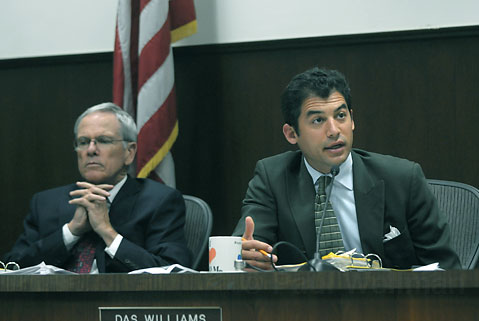
If a tax on plastic shopping bags is going to be imposed in Santa Barbara anytime soon, the City Council let supporters of such a plan know they’ll have to do the political grunt work of collecting the signatures to qualify for the ballot themselves; the council members made it clear they won’t be doing it for them. First, a coalition of environmental organizations pushing for a bag tax pressed the council to spend $23,000 on a survey to determine voter attitudes on such a levy. Given the harsh economic realities confounding City Hall, even council members sympathetic to the bag tax agenda regarded the request as politically tone deaf.
While a clear majority of council members indicated they’d support placing a bag tax on the ballot, that wasn’t enough. Election rules required the vote to be unanimous. “To the person who asked how anyone could be against this,” declared Councilmember Frank Hotchkiss, “I am that guy.” Instead of killing the proposal outright, however, the council voted to table it until July, when fresh data on City Hall’s fiscal plight will be available. More than once, Mayor Helene Schneider — sympathetic to the bag tax — suggested that supporters of the bag tax look to themselves to qualify the measure for the ballot.
Some environmentally minded politicians, like Councilmember Das Williams, have been quick to seize on the revenues that a bag tax might generate. Williams suggested that such a surcharge could raise as much as $3.5 million a year. That could go a long way, he said, toward easing some of the pain the council is about to inflict in response to this year’s $9-million budget shortfall. “We’re about to do terrible things,” Williams warned. “Imposing a tax that people could choose to pay or not pay is about the least bad thing we’ll be asked to do in the next couple of months,” he said. As proposed, a tax of up to 25 cents per bag could be charged on supermarket customers; by contrast, customers who brought their own bags would experience a small, but noticeable, savings. Proponents said the 5-cent bag tax just passed by Washington, D.C., was generating $150,000 a month in revenue, while plastic bag-use plummeted from 22 million a month to three million.
In Santa Barbara, roughly 1,000 tons of plastic bags are deposited in the Tajiguas landfill each year. Residential recyclers who place their plastic bags in the blue curbside barrels might be surprised to discover that those bags are not, in fact, recycled, but sent to the landfill instead. The plastic bags collected in front of supermarkets, however, are recycled and transformed into synthetic lumber products. Statewide, California shoppers burn through 19 billion bags a year. That translates to about 750 bags per capita. While such bags cost only a few pennies apiece, environmentalists contend their cradle-to-grave costs — picking them up and disposing of them — is closer to 17 cents per bag. The California Grocery Association (CGA) prefers educational campaigns designed to persuade shoppers to embrace reusable bags rather than taxing schemes or regulatory bans. But failing that, said spokesperson Dave Heylen, the CGA contends that all bags — not just plastic ones — should be taxed and that the tax be imposed statewide and upon all retailers, not just supermarkets.
For the past seven months, City Hall has been pushing a “Where’s Your Bag?” campaign, designed to encourage shoppers to use canvas or other reusable tote bags whenever and wherever possible. Few businesses have embraced this campaign so earnestly as Tri-County Produce, where owner John Dixon encourages reusable bag owners by making small donations to the charity of their choice. Since last September, Dixon reported the percentage of Tri-County Produce shoppers bringing their own bags increased from 31 percent to 39 percent. Dixon, who opposed the proposed bag tax, said educational campaigns get results. So, too, did Councilmember Dale Francisco. But Williams, who pushed hard on behalf of the bag tax, said that’s not enough. “It’s naïve to think voluntary efforts will succeed,” he said. “Tri-County has done a great job, but it won’t get the job done.”



